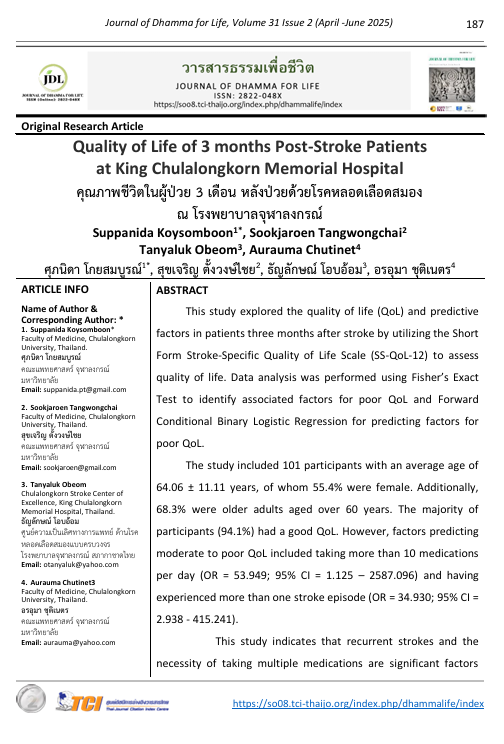คุณภาพชีวิตในผู้ป่วย 3 เดือน หลังป่วยด้วยโรคหลอดเลือดสมอง ณ โรงพยาบาลจุฬาลงกรณ์
Main Article Content
บทคัดย่อ
งานวิจัยนี้เป็นการศึกษาคุณภาพชีวิตและปัจจัยทำนายในผู้ป่วยภายหลังป่วยด้วยโรคหลอดเลือดสมองมา 3 เดือน โดยใช้แบบวัดคุณภาพชีวิตเฉพาะผู้ป่วยโรคหลอดเลือดสมอง ฉบับย่อ (SS-QoL-12) วิเคราะห์ข้อมูลโดยใช้สถิติ Fisher’s Exact Test และ Forward Conditional Binary Logistic Regression ผลการศึกษา กลุ่มตัวอย่าง 101 คน มีอายุเฉลี่ย 64.06 ± 11.11 ปี เพศหญิงร้อยละ 55.4 เป็นผู้สูงวัยอายุมากกว่า 60 ปีร้อยละ 68.3 กลุ่มตัวอย่างส่วนใหญ่มีคุณภาพชีวิตอยู่ในระดับดีร้อยละ 94.1 มีปัจจัยทำนายคุณภาพชีวิตไม่ดี ได้แก่ การมีจำนวนยากินเกิน 10 ชนิด/วัน (OR = 53.949; 95%CI = 1.125 – 2587.096) และเคยป่วยเป็นโรคหลอดเลือดสมองมากกว่า 1 ครั้ง (OR = 34.930; 95%CI = 2.938 - 415.241) จากการศึกษานี้ชี้ให้เห็นว่า ปัจจัยที่ส่งผลต่อคุณภาพชีวิตที่ไม่ดี คือ การเกิดซ้ำของโรคหลอดเลือดสมอง และการที่ผู้ป่วยจำเป็นต้องใช้ยารักษาเป็นจำนวนมาก การให้ความสนใจดูแลผู้ที่มีความเสี่ยงเหล่านี้ตั้งแต่ระยะต้น จะช่วยเพิ่มประสิทธิภาพที่ดีในการฟื้นฟูสมรรถภาพทางร่างกายของผู้ป่วยต่อไป


